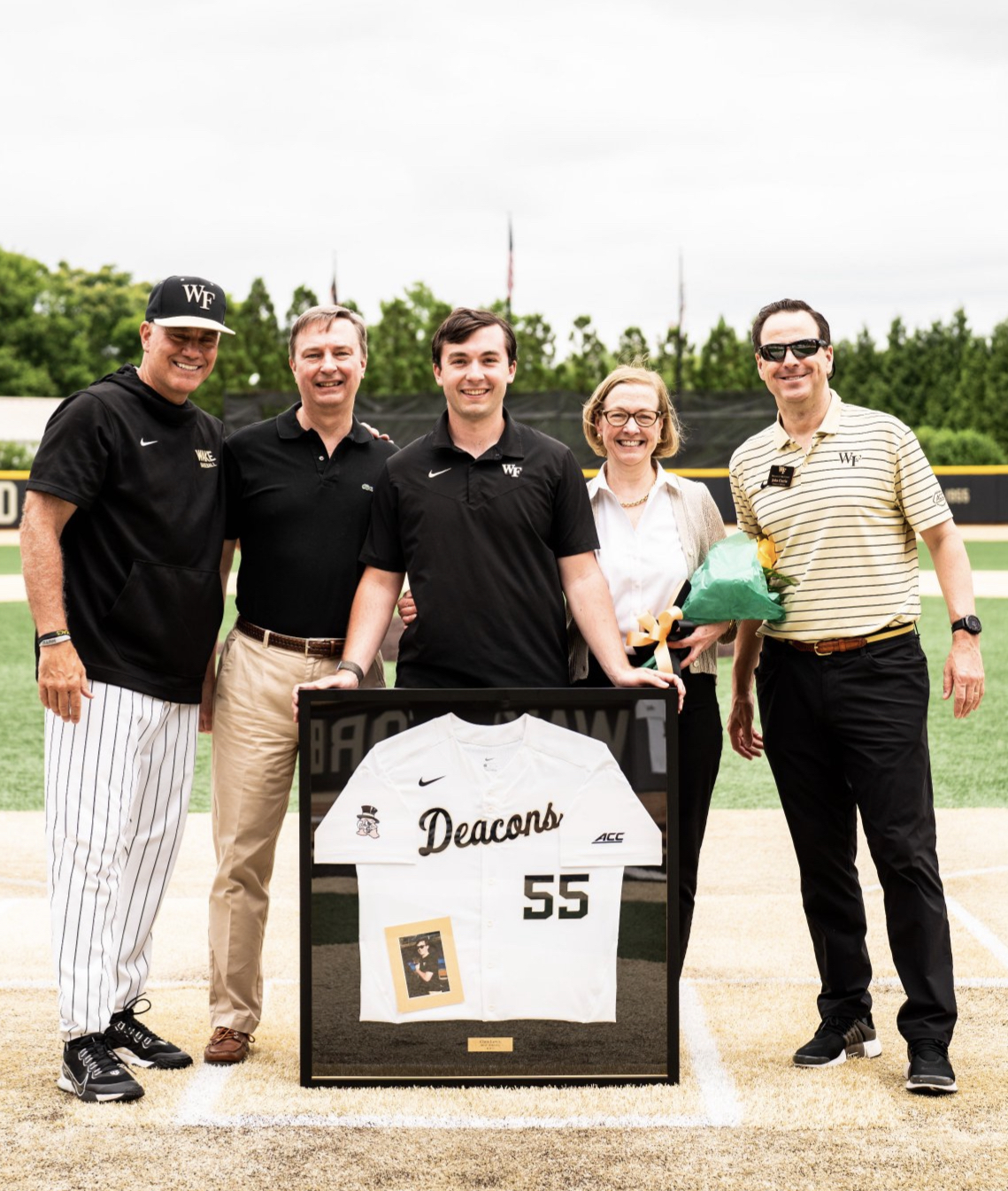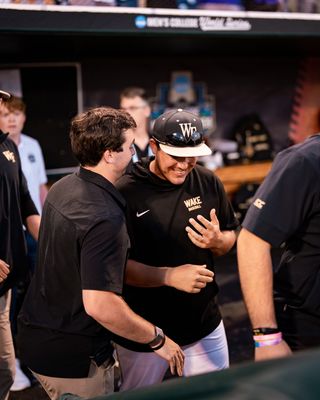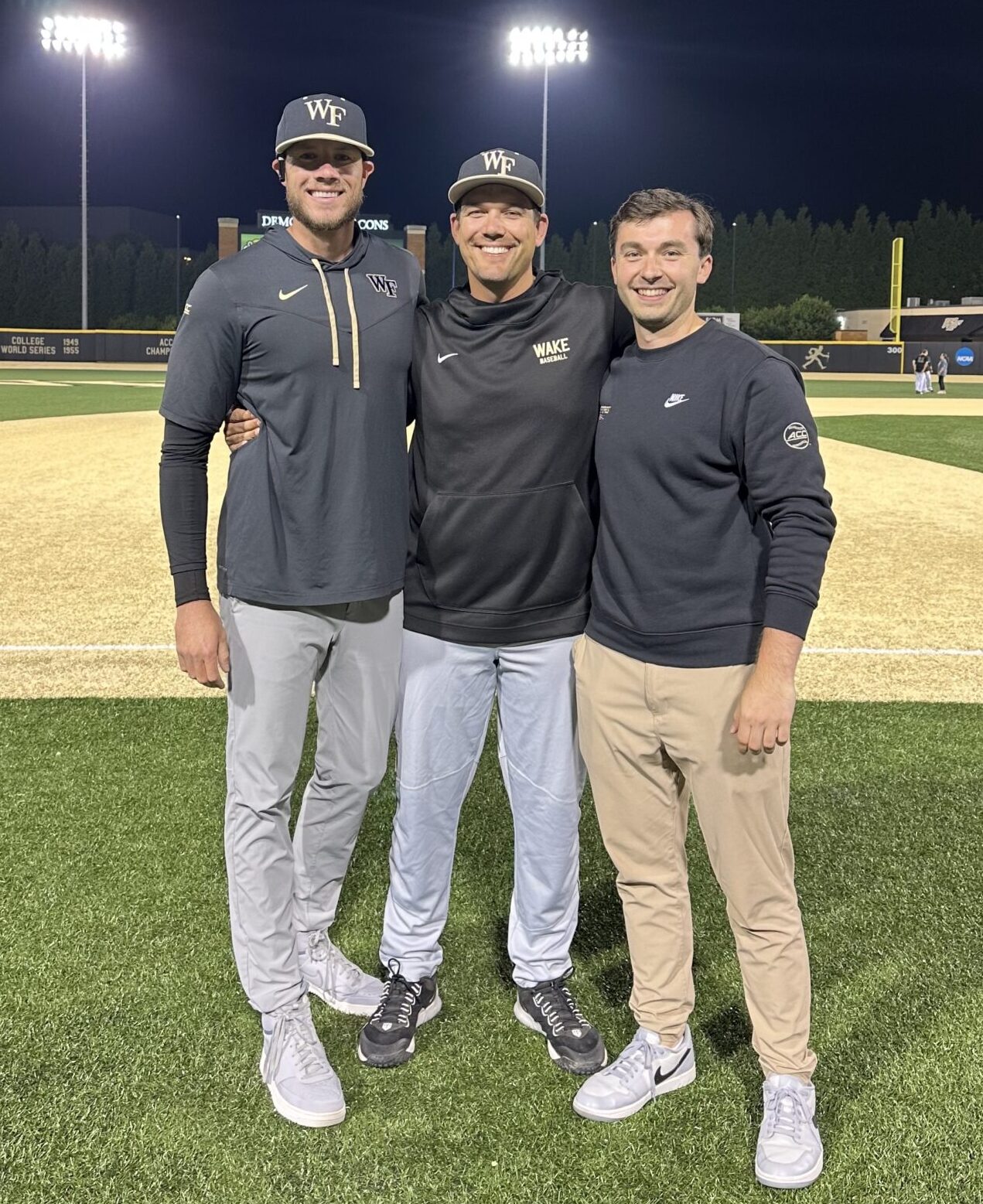
Chris Lewis ('22, MSA '23) with Coach Tom Walter (P '23), Lewis's parents Marc and Lori Lewis and Director of Athletics John Currie ('93)
The Wake Forest baseball team’s run to the Men’s College World Series in June kept Deacon fans pulling out their lucky shirts, caps and coffee mugs long after they typically stow them for the summer.
But while we cheered for Rhett Lowder and Brock Wilken and the other Diamond Deacs on the field, Chris Lewis (’22, MSA ’23) was leading another team of students off the field, offering hard data in addition to vibes to help the Deacons get to Omaha.
Lewis was the baseball program’s director of analytics for its historic 2023 season. He and a team of 22 undergraduate and graduate students used cutting-edge technology to collect and analyze data from practices, games and biomechanics to help head coach Tom Walter (P ’23), pitching coach Corey Muscara and the rest of the staff improve the team’s own weaknesses and target opponents’. (We asked for more on what exactly they study, but Lewis and the coaches treat that information like trade secrets.)
“It cannot be overstated how much our data team means to our program,” said Mike McFerran, the director of player development and pitching lab coordinator. “The information we collect and the context that is provided to us is where we find competitive advantage. This makes their role vital to our success.”
“We call him ‘Codes,’” Muscara added, “short for ‘Cheat Codes’” as in the secret tricks that savvy video-game players use to level up.

Lewis in the dugout with pitching coach Corey Muscara
Lewis is quick to share the credit for the miraculous season, which finally came to an end in a (2-0) loss to Louisiana State University — just missing the championship series.
“There’s this whole team of students who are willing to help out in any way possible,” Lewis said. “We really made it a mission of ours, that anything we do is going to help us win more baseball games.”
The analytics team members work with hard data, but luck threads through the story of how they came together — and how Lewis not only came to lead them last year but came to Wake Forest at all.
“I think I was always a baseball fan,” Lewis said. “My mom tells a story of me watching the ‘Subway Series’ (the 2000 World Series between the New York Mets and New York Yankees) when I was four or five months old. For as long as I can remember, baseball has been something I was involved with, something I wanted to do.”
Growing up in Saddle River, New Jersey, Lewis dreamed of becoming the general manager of a Major League Baseball team and played the sport “from the time I was old enough to hold a bat until the end of my high school career.” He thought about trying to play in college, but “I knew I wasn’t good enough to play at the kind of college I wanted to attend.”
At first the “kind of college” he wanted to attend did not include Wake Forest. His mother “made” him apply, and even after his acceptance he wasn’t sold on the school.
Demon Deacons don’t need sophisticated data analysis to know what changed his mind: He visited campus.
“I came to visit Winston at the beginning of April,” he said. “In New Jersey it had just snowed. I came down to Winston, and it was 75 and sunny and beautiful. I remember walking around the campus and just knowing in my heart that this was it.”
“It cannot be overstated how much our data team means to our program."

Lewis expected to become an accountant, not a baseball analyst.
By then, Walter, who came to Wake Forest in 2010, had turned the baseball program into a consistent winner, but Lewis said that played no part in his decision.
“I had no idea about the baseball team or anything to do with analytics,” said Lewis, who had assumed he would go back to New York and work in accounting. “It just happened to work out that way.”
At a tryout for Wake Forest’s club baseball team in the fall of his sophomore year, Lewis struck up a conversation with a senior, Sam Denomme (’20), the president of the Wake Forest Sports Analytics Club. Denomme had been helping the baseball team on the side and told Lewis that the club could use more student analysts.
“I said, ‘Sure, why not?” Lewis said.
The next season, though, was 2020: the COVID-19 year. The baseball team played only one series against an ACC opponent before the season was canceled, and students, including student-athletes and student analysts, were sent home.
Lewis said that during the lockdown he “spent a lot of time working on coding,” trying to better learn “how it can help me help the baseball team.”
When he and the others came back to campus, they set about giving their work more structure, which led the baseball staff to incorporate their analytics more into the day-to-day operations of the team.
“I credit another alum, Chad Raines (MSBA ’21), for helping us build some structure around the data we were building,” Lewis said.
In the summer of 2021, Walter made a few key hires, including Muscara and McFerran. Lewis said those hires were “the turning point” for the student analysts.
The coaches “saw a lot of potential in what we could provide,” Lewis said. “I think they saw it as an untapped resource.”
Muscara said, “All the data they give me on our opponents, if I were to do it myself, it’d take me at least 15 hours. They’re able to do it in 30 minutes.”

Mike McFerran, the director of player development and pitching lab coordinator, and pitching coach Corey Muscara with Lewis
Every player who came to Wake Forest from the transfer portal more than doubled his production because “we were finding value in places that other people aren’t looking,” he says. Muscara knows of only one other school in the country — the University of Iowa — with as robust an analytics department as Wake Forest’s, but he says that the Hawkeyes’ isn’t nearly as comprehensive.
Going into the canceled COVID-19 season, Lewis was one of four student analysts helping the baseball team. Last season, he led a team of 22 and had to turn people away. “There’s definitely a growing interest in baseball analytics and sports analytics in general” at Wake Forest, Lewis said, adding that he’d “be remiss if I didn’t emphasize how much of a team effort this was. Nothing we accomplished would have been possible without the (analytics) team we had.”
For some, that interest has opened doors to the kinds of career paths they dreamed of as children. Muscara said six former analysts now work in professional baseball. Denomme, who got Lewis involved, works for the Boston Red Sox organization; Raines and Nihar Maskara (’23) are with the Minnesota Twins.
Once Wake Forest’s College World Series run finally ended, Lewis took a job as a pitching development analyst for the Toronto Blue Jays organization. He describes it as “a hybrid role between player development and R&D,” in which he builds development plans for players and statistical tools for further analysis.
He’s still striving toward fulfilling his childhood dream of becoming an MLB general manager while recognizing that there are “a lot of things GMs do that I have no idea about.”
“It sounds kind of cliché, but I’m taking it day by day,” he said, “and trying to be in a position to take advantage of whatever comes my way.”
Whatever does come his way, inside baseball or out, he says it will have a hard time topping the Deacons’ run to Omaha.
“Magical. That’s the only way I can describe it. The most fun I’ve had in baseball in my life,” he said. “It didn’t just start to be great in May or June. It was an unbelievable time from the fall onwards.”
Ed Southern (’94) is the author of “Fight Songs” and the executive director of the North Carolina Writers’ Network.


